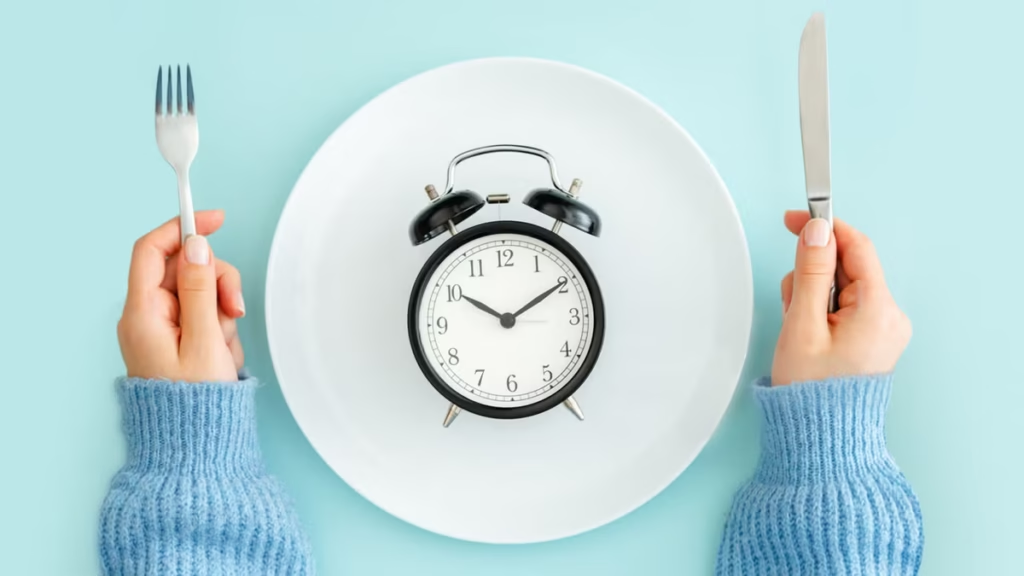In recent years, intermittent fasting (IF) has become a popular lifestyle choice among men aiming to lose weight, boost energy, and improve overall health. But beyond fat loss and fitness, an intriguing question is gaining traction: Can intermittent fasting enhance men’s sexual health? From testosterone levels and libido to blood flow and performance, sexual wellness is deeply tied to several factors that IF may influence. While some claim fasting has transformed their confidence and stamina, others worry it might do more harm than good if not done properly. So, what does the science say?
Recommended: Will Losing Weight Help Improve Erectile Function?
In this blog post, we’ll explore the potential benefits—and drawbacks—of intermittent fasting on male sexual health, and help you understand whether it’s a game-changer or just hype.
What Is Intermittent Fasting and How Does It Work?
Intermittent fasting (IF) isn’t a diet in the traditional sense — it’s a pattern of eating that cycles between periods of eating and fasting. Instead of focusing on what you eat, it emphasizes when you eat. The idea is to allow your body enough time to fully digest and tap into stored fat for energy during fasting windows.

There are several popular methods of intermittent fasting:
- 16:8 method: Fast for 16 hours, eat during an 8-hour window (e.g., 12 p.m. to 8 p.m.).
- 5:2 method: Eat normally for 5 days, then reduce calorie intake (about 500–600 calories) for 2 non-consecutive days.
- One Meal a Day (OMAD): Fast for 23 hours and eat one large meal within a 1-hour window.
So, how does this affect your body?
During fasting, insulin levels drop, and your body starts burning stored fat for energy. Human growth hormone (HGH) levels may rise, supporting muscle growth and fat metabolism. Cells also undergo a repair process called autophagy, clearing out damaged cells and waste — a process that can benefit not just your physical health but potentially your hormonal balance as well.
Recommended: Will Testosterone Therapy Help with Erectile Dysfunction?
For men, these internal shifts may influence testosterone production, energy levels, mental clarity, and possibly sexual performance. But as promising as it sounds, results vary depending on your lifestyle, body type, and how you implement fasting.
The Link Between Testosterone and Fasting
Testosterone is the cornerstone of male sexual health. It plays a vital role in libido, erectile function, muscle growth, energy, and overall mood. So, it’s no surprise that men are curious whether intermittent fasting (IF) can naturally boost this key hormone.
Some studies suggest that intermittent fasting may have a positive effect on testosterone levels, especially when paired with healthy eating and strength training. Here’s how:
1. Improved Insulin Sensitivity
Fasting helps reduce blood sugar and insulin levels. Since high insulin can suppress testosterone, better insulin control may indirectly support higher testosterone production.
2. Boost in Human Growth Hormone (HGH)
Intermittent fasting has been shown to increase levels of HGH, which works in synergy with testosterone to improve muscle mass, fat metabolism, and energy. This hormonal combo can enhance not just physical performance, but potentially sexual vitality too.
3. Reduction in Body Fat
Body fat — especially around the belly — is linked to lower testosterone. IF can help men lose fat without losing muscle, and leaner bodies often produce more testosterone naturally.
Recommended: How to Fix Delayed Ejaculation from Antidepressants
4. Balanced Cortisol Levels
Chronic stress raises cortisol, a hormone that can suppress testosterone. Short, controlled fasting may help lower baseline stress in some men, contributing to better hormonal balance. However, excessive fasting or under-eating can do the opposite.
Is Intermittent Fasting Good for Men’s Sexual Health?
Intermittent fasting (IF) has become more than just a weight loss trend — it’s also being explored for its potential benefits on men’s sexual health. By cycling between periods of eating and fasting, the body experiences hormonal shifts that may support improved testosterone levels, enhanced energy, and better overall metabolic function. These changes can play a direct role in boosting libido, sexual stamina, and performance.
One of the key connections lies in IF’s ability to reduce insulin levels, support fat loss, and increase human growth hormone — all of which contribute to a more favorable environment for testosterone production. Since testosterone is the primary hormone responsible for sex drive and reproductive health in men, maintaining it at healthy levels is essential. Fasting may also improve blood flow, reduce inflammation, and boost mental clarity, all of which support not just sexual function but also desire and confidence.

However, intermittent fasting is not a one-size-fits-all solution. While it can improve sexual health for some men, overdoing it or undernourishing the body may have the opposite effect — leading to fatigue, low libido, or hormonal imbalance. Like any health practice, IF works best when paired with proper nutrition, exercise, good sleep, and stress management. When done right, it can be a powerful tool for not only physical transformation but also improved sexual well-being.
Recommended: Natural Ways to Increase Testosterone for Better Male Vitality
Potential Downsides of Intermittent Fasting on Sexual Health
While intermittent fasting (IF) can offer a range of benefits for men’s health, it’s not without risks — especially when it comes to sexual wellness. Fasting affects hormone levels, energy balance, and nutrient intake, all of which are deeply connected to sexual function. When done improperly or too aggressively, IF may actually harm your libido and performance.
1. Decreased Testosterone from Over-Fasting
Though short-term fasting can support testosterone, extended or extreme calorie restriction may lead to a drop in testosterone levels. When your body is in a constant state of energy deficit, it may shift into “preservation mode,” reducing reproductive hormones to conserve energy — leading to low libido, fatigue, and poor sexual performance.
2. Nutrient Deficiencies
Skipping meals too often without ensuring proper nutrient intake during eating windows can result in vitamin and mineral deficiencies, especially in zinc, magnesium, and healthy fats — all crucial for testosterone production and sexual health. Over time, this can lead to hormonal imbalance and lower sexual function.
3. Stress, Cortisol, and Mood Issues
Fasting can raise cortisol, the body’s stress hormone, especially in men who combine fasting with overtraining or lack of sleep. High cortisol interferes with testosterone and can cause anxiety, irritability, or mood swings — all of which can negatively affect sexual desire and intimacy.
Best Fasting Practices for Supporting Sexual Health
If you’re interested in using intermittent fasting (IF) to boost your sexual health, it’s important to approach it the right way. When done mindfully, fasting can help balance hormones, improve energy, and enhance libido. But it requires a smart plan that supports—not drains—your body.
Recommended: Diet Tips for Naturally Improving Male Performance
1. Choose a Sustainable Fasting Window
Stick to moderate fasting windows like the 16:8 method (fasting for 16 hours, eating within 8 hours). This approach is generally well-tolerated by most men and still supports hormonal balance. Avoid extreme fasts (e.g., OMAD) unless supervised, as they can lead to low energy and suppressed testosterone.
2. Break Your Fast with Nutrient-Rich Foods

What you eat after a fast matters. Break your fast with high-protein meals that include healthy fats (like avocados, nuts, or olive oil) and complex carbs (like sweet potatoes or whole grains). Include foods rich in zinc, magnesium, and B vitamins, which are essential for testosterone production and sexual function.
3. Prioritize Recovery and Stress Management
Get enough quality sleep, avoid overtraining, and manage stress levels. These factors have a major impact on both testosterone and libido. Pair your fasting routine with light exercise, like strength training and walking, rather than intense workouts during long fasts.
4. Stay Hydrated and Don’t Skip Electrolytes
Dehydration can lead to fatigue, mood swings, and decreased sexual energy. Drink plenty of water, and consider adding electrolytes or a pinch of sea salt to your water during fasts to maintain balance.
Recommended: Can Hydrogen Peroxide be Used For Erectile Dysfunction?
5. Listen to Your Body
If you begin to feel overly tired, irritable, or notice a drop in sex drive, it might be a sign you’re under-eating or fasting too long. Intermittent fasting is a tool, not a punishment. Adjust your routine based on how your body responds.
Conclusion
Intermittent fasting can be a powerful tool not just for weight loss and metabolic health, but also for supporting men’s sexual well-being. By naturally improving insulin sensitivity, boosting testosterone, and enhancing mental and physical energy, IF may contribute to a stronger libido, better sexual performance, and improved confidence. For many men, the benefits go beyond the physical — fasting can also promote clarity, discipline, and a better connection to one’s body.
However, like any lifestyle approach, success lies in balance. Over-fasting, poor nutrition, or ignoring your body’s signals can lead to hormonal imbalances, fatigue, and reduced libido. That’s why it’s crucial to pair intermittent fasting with a nutrient-dense diet, good sleep, stress management, and regular exercise.
In the end, intermittent fasting isn’t a one-size-fits-all fix, but when done correctly, it can support a healthier, more energized, and more sexually vibrant life. As always, it’s wise to consult with a healthcare provider before starting any new fasting routine — especially if sexual health and hormone levels are a concern.
